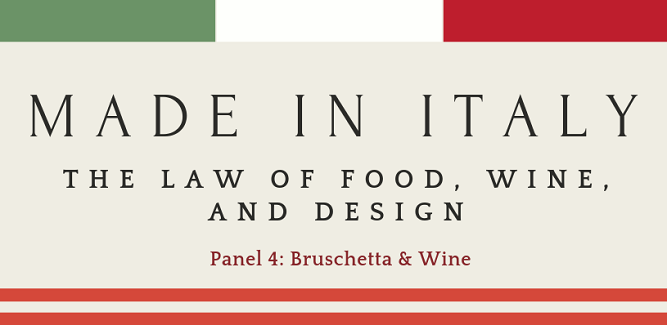
Event Title
Panel 4: Bruschetta and Wine
Location
Large Courtroom, FIU College of Law
Start Date
21-2-2020 4:15 PM
End Date
21-2-2020 5:30 PM
Description
Securing Credit for Made in Italy Products: The Case of Prosciutto, Cheese and Grappa
Jorge Esquirol, Florida International University College of Law
Credit is key to business development. Access to credit and low-cost credit may mean the difference between profits and losses, sustainability and bankruptcy. These are the types of comparative advantages that national legal rules can either enable or curtail. Italian law has traditionally been quite restrictive of using non-registered assets—such as business equipment and inventory—as collateral for loans and financing. Certain premier Made in Italy products, however, benefit from special legislation that allows their stocks, warehoused during the aging process, to serve as loan guarantees. Prosciutto, cheeses, and more recently grappa are part of that list. These differential laws direct a subsidy of sorts to these products. This essay will examine the Italian model of secured transactions law and consider its effects in promoting specific products, industries, and creditors.
Mozzarella di Bufala: The Legal Construction of an Iconic Cheese
Michele Graziadei, Università degli Studi di Torino
Mozzarella di bufala has been rightly described as the “White Whale of American cheesemaking.” The attempt to make this cheese in the US has been mostly unsuccessful so far. The dream to produce mozzarella di bufala in the United States “has destroyed businesses from Vermont to Los Angeles.” Yet this fantastic cheese is regularly consumed on the tables of thousands of Italians each day. This essay will show how the production of mozzarella di bufala DOP in Italy is regulated by a thick set of laws and regulations, which contributed to the emerging of mozzarella di bufala as an iconic food, deservedly mentioned as “one of the miracles of Italian cuisine.” These rules result out of the coordinated efforts of a group of producers that managed to overcome some of the constraints associated with the small scale dimensions of their farms and that were thus able to develop a viable strategy for a niche product that would eventually pay off. The paper examines as well some of the tensions and problems associated with these developments.
Like Oil Floating on Water: EU Law & the “Great Tree Massacre” of Puglia’s Olive Groves
Tommaso Pavone, Princeton University
This article analyzes how the application of European Union (EU) law can clash with longstanding local practice to catalyze contentious politics and entrench non-compliance. It does so via an in-depth case study of the socio-legal crisis following the 2013 outbreak of Xylella fastidiosa, a plant pathogen that restricts water flow in the plant it infects, amidst the olive groves of Puglia, Italy. The Xylella case prompted interventions by the European Commission and the European Court of Justice to preclude the pathogen’s diffusion by applying EU environmental regulations and mandating the eradication of thousands of centenarian olive trees. In a local context plagued by political gridlock and where olive groves symbolize agricultural life and community identity, these legal measures quickly ignited a farmers’ revolt blaming Europe for waging a “great tree massacre.” Given longstanding deficits in EU legal training within Puglia’s legal community, lawyers and judges failed to constructively mediate the resulting clash between EU legal obligations and local knowledge. Instead, they joined the farmers’ Euroskeptic revolt by trafficking in conspiracy theories and mobilizing to obstruct compliance. Ultimately it was not just millions of olive trees that desiccated into chalky skeletal remains: This case study reveals that without on-the-ground “interpretive mediators” mobilizing pro-EU frames in times of crisis, the politicization of EU law can desiccate compliance efforts and foster the perception that EU law is as distant from lived experience as oil floating on water.
Panel 4: Bruschetta and Wine
Large Courtroom, FIU College of Law
Securing Credit for Made in Italy Products: The Case of Prosciutto, Cheese and Grappa
Jorge Esquirol, Florida International University College of Law
Credit is key to business development. Access to credit and low-cost credit may mean the difference between profits and losses, sustainability and bankruptcy. These are the types of comparative advantages that national legal rules can either enable or curtail. Italian law has traditionally been quite restrictive of using non-registered assets—such as business equipment and inventory—as collateral for loans and financing. Certain premier Made in Italy products, however, benefit from special legislation that allows their stocks, warehoused during the aging process, to serve as loan guarantees. Prosciutto, cheeses, and more recently grappa are part of that list. These differential laws direct a subsidy of sorts to these products. This essay will examine the Italian model of secured transactions law and consider its effects in promoting specific products, industries, and creditors.
Mozzarella di Bufala: The Legal Construction of an Iconic Cheese
Michele Graziadei, Università degli Studi di Torino
Mozzarella di bufala has been rightly described as the “White Whale of American cheesemaking.” The attempt to make this cheese in the US has been mostly unsuccessful so far. The dream to produce mozzarella di bufala in the United States “has destroyed businesses from Vermont to Los Angeles.” Yet this fantastic cheese is regularly consumed on the tables of thousands of Italians each day. This essay will show how the production of mozzarella di bufala DOP in Italy is regulated by a thick set of laws and regulations, which contributed to the emerging of mozzarella di bufala as an iconic food, deservedly mentioned as “one of the miracles of Italian cuisine.” These rules result out of the coordinated efforts of a group of producers that managed to overcome some of the constraints associated with the small scale dimensions of their farms and that were thus able to develop a viable strategy for a niche product that would eventually pay off. The paper examines as well some of the tensions and problems associated with these developments.
Like Oil Floating on Water: EU Law & the “Great Tree Massacre” of Puglia’s Olive Groves
Tommaso Pavone, Princeton University
This article analyzes how the application of European Union (EU) law can clash with longstanding local practice to catalyze contentious politics and entrench non-compliance. It does so via an in-depth case study of the socio-legal crisis following the 2013 outbreak of Xylella fastidiosa, a plant pathogen that restricts water flow in the plant it infects, amidst the olive groves of Puglia, Italy. The Xylella case prompted interventions by the European Commission and the European Court of Justice to preclude the pathogen’s diffusion by applying EU environmental regulations and mandating the eradication of thousands of centenarian olive trees. In a local context plagued by political gridlock and where olive groves symbolize agricultural life and community identity, these legal measures quickly ignited a farmers’ revolt blaming Europe for waging a “great tree massacre.” Given longstanding deficits in EU legal training within Puglia’s legal community, lawyers and judges failed to constructively mediate the resulting clash between EU legal obligations and local knowledge. Instead, they joined the farmers’ Euroskeptic revolt by trafficking in conspiracy theories and mobilizing to obstruct compliance. Ultimately it was not just millions of olive trees that desiccated into chalky skeletal remains: This case study reveals that without on-the-ground “interpretive mediators” mobilizing pro-EU frames in times of crisis, the politicization of EU law can desiccate compliance efforts and foster the perception that EU law is as distant from lived experience as oil floating on water.

